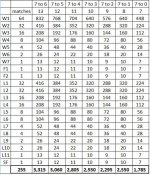128 person bar table 9 BALL tournament $$$
I estimate that in a DE tournament, racing to 7 on both sides there are 190 matches total. I estimate average number of games played per match is 12 games. If the cost of the table is $1 per game, the total coins in the table come to $2280.00. If the event has a $40 entry fee with a full field the purse money would be $5120.00.
I'm not factoring in added money, just looking at total expenses for 128 players.
Do you think these numbers are fairly accurate? If not what are your estimates?
I estimate that in a DE tournament, racing to 7 on both sides there are 190 matches total. I estimate average number of games played per match is 12 games. If the cost of the table is $1 per game, the total coins in the table come to $2280.00. If the event has a $40 entry fee with a full field the purse money would be $5120.00.
I'm not factoring in added money, just looking at total expenses for 128 players.
Do you think these numbers are fairly accurate? If not what are your estimates?
Last edited:
